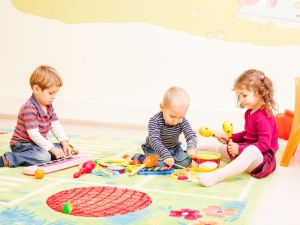The Significance of Play in Early Childhood Learning and Development
 Play is a natural and integral part of a child’s life, and it is crucial for their overall development and learning. Children through the EYFS curriculum learn and grow in many ways through play, and it has been proven to have a significant impact on their cognitive, physical, social, and emotional development. This article aims to discuss the role of play in a child’s development, why it’s important for learning, and the different types of play that support learning.
Play is a natural and integral part of a child’s life, and it is crucial for their overall development and learning. Children through the EYFS curriculum learn and grow in many ways through play, and it has been proven to have a significant impact on their cognitive, physical, social, and emotional development. This article aims to discuss the role of play in a child’s development, why it’s important for learning, and the different types of play that support learning.
Role of Play in Child Development
Play is a child’s way of exploring and making sense of the world around them. It helps them to develop their creativity, imagination, and problem-solving skills and have high self-confidence. Play allows children to learn and understand the world at their own pace, and they can try out different roles, relationships, and scenarios in a safe and controlled environment. This enables them to experiment, make mistakes, and learn from their experiences, which is essential for their growth and development.
Play is also essential for children’s physical development. Children need to move and explore the world around them, and play provides them with an opportunity to do this. Physical play helps children to develop their motor skills, balance, coordination, and strength. It also provides them with opportunities to take risks, climb, and run, which helps to build their confidence and resilience.
The social aspect of play is also important in child development. Play allows children to interact with others and develop their social skills, such as communication, cooperation, and empathy. Children learn to negotiate, share, and take turns, which are all essential skills for their future relationships.
Moreover, play is important for children’s emotional development. Play provides children with opportunities to express their feelings and emotions, and to learn to understand and manage their emotions. Play helps children to feel safe, secure, and confident, which is essential for their emotional well-being.
Why is Interaction Play Important for Learning?
Interaction Play is important for learning because it provides children with opportunities to develop their skills, learn new things, and improve their knowledge. Children learn best through play because it is fun, engaging, and relevant to their lives. When children play, they are in control of their own learning, and they can choose what they want to do and how they want to do it. This makes learning more meaningful and enjoyable for them.
Play also helps children to develop their creativity, imagination, and problem-solving skills. Children can try out different scenarios and ideas, and they can experiment with different materials and tools. This allows them to develop their creativity and imagination, and to find new and innovative ways of solving problems.
Different Types of Play that Support Learning
There are many different types of play that support learning, and it is important for parents and educators to provide children with a variety of play experiences. Some of the different types of play that support learning include:
- Pretend play – This type of play involves children pretending to be someone or something else. It allows them to experiment with different roles, relationships, and scenarios, and to develop their creativity and imagination.
- Social play – Social play involves children playing and interacting with others. It helps to develop their social skills, such as communication, cooperation, and empathy.
- Sensory play – Sensory play involves children exploring the world through their senses, such as touch, taste, smell, and sound. It helps to develop their sensory awareness and curiosity.
- Construction play – Construction play involves children building and constructing things
- Social play – Social play involves children playing and interacting with others. It helps to develop their social skills, such as communication, cooperation, and empathy.



Leave A Comment